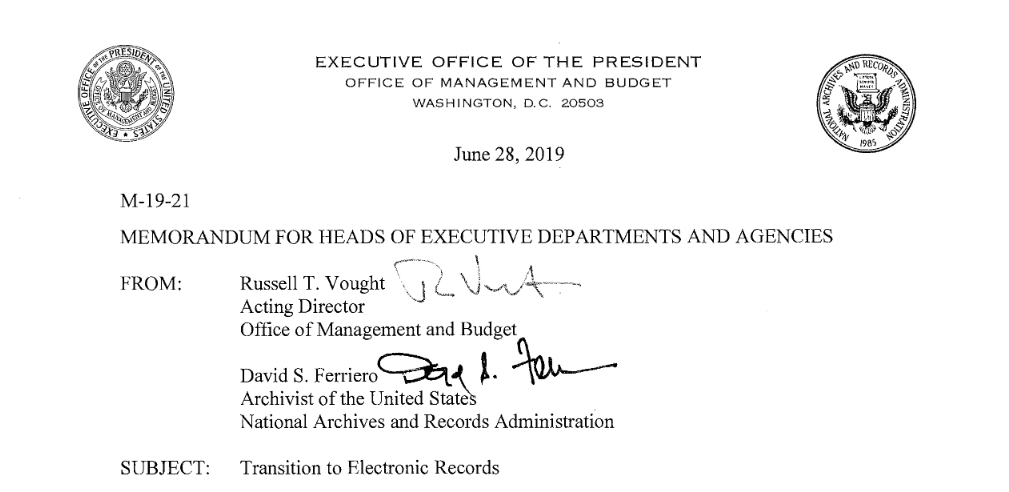The US Government knew they needed to get a handle on the inefficiencies they experienced with paper records. Several factors influenced the decision to improve record management processes, including the business case need for electronic record keeping (ERK), and the alignment of ERK with the agency’s mission and strategic initiatives.
Additional factors, such as legal, statutory, and regulatory requirements also played a part in the verdict. Ultimately, agencies determined they needed a more up to date system for managing enormous amounts of records.
To modernize government record keeping, NARA and the Whitehouse decided to create a new, 21st-century framework for government record management. In conjunction with their colleagues at NARA, the White House issued the NARA M-19-21 mandate.
By the end of 2019, Federal Agencies must manage all permanent records electronically. By 2022, they must also manage temporary records the same way. This mandate applies to all electronic records, regardless of where they live. Although this law applies mostly to Senior Agency Officials for Record Management (SAORM), and Agency Records Officers, it’s essential that all government employees take proactive measures to safeguard records per this new policy.
According to the National Archives and Records Administration: Criteria for Successfully Managing Permanent Electronic Records, there are four high-level view components to successfully managing electronic records. The first criteria suggest administering company-wide polices that explain how employees are expected to manage electronic records. Next, to help with educating employees about record responsibilities, training programs should be enforced, and record requirements need to be considered throughout the development process to make sure that the selected automated system supports these requirements. Secure record keeping is vital, but agency employees should also be able to access records when needed. Furthermore, documents must be transferred to NARA in the appropriate format with the correct metadata.
In addition to high-level view components, there are also operational activities and universal electronic records management requirements that NARA recommends for successfully managing permanent electronic records. For example, at an executive level, agencies should regularly review record schedules to assess whether records have become obsolete or superseded, consult stakeholders to confirm the owners of permanent electronic records, and maintain the ERM system for the duration of their retention periods.
NARA cites several more examples, and agencies should visit NARA’s website to view the complete list of suggested activities and requirements.
Feith’s experts can help guide M-19-21 compliance
For agencies who still need to digitalize and manage their records, the mandate’s deadline is swiftly approaching; the time to act is now. Agencies should consider Feith’s solution to help successfully digitalize and manage their records.
The Feith team has helped guide many agencies during their transition from paper to electronic records. To learn more about how we can help tackle the mandate, contact the Feith team today!

